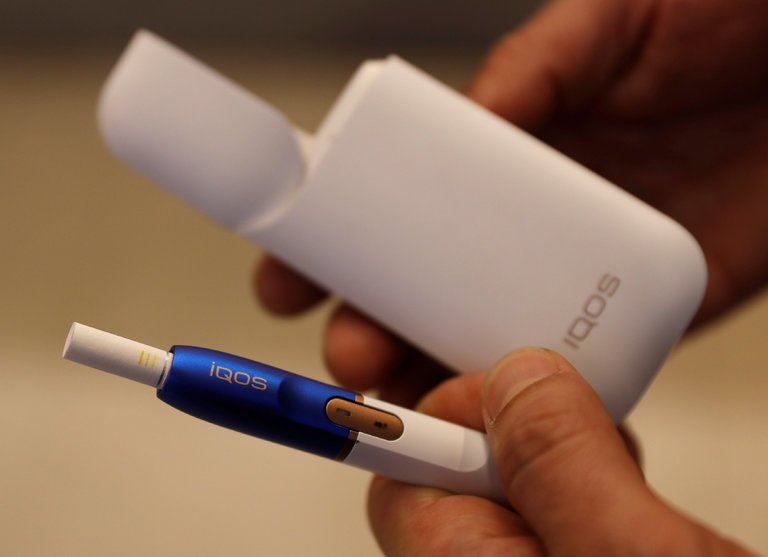
A federal advisory committee on Thursday recommended that the Food and Drug Administration reject a bid by Philip Morris International to market a smokeless tobacco stick in the United States as safer than traditional cigarettes.
The product, called IQOS, is an electronic penlike device that heats tobacco sticks but does not burn them. It releases nicotine vapor, which the company says is less hazardous than smoke. It is already sold in 30 countries, and is especially popular in Japan.
The company says that IQOS, which contains tobacco as well as nicotine, offers a more natural smoking experience for the smoker than e-cigarettes, its competitor in the growing category of alternative nicotine delivery systems.
The advisory committee met for two days to consider the company’s proposal to sell the product under the agency’s new “modified risk” category, created by Congress with the passage of the 2009 Family Smoking Prevention and Tobacco Control Act. The law was intended to encourage development of safer alternatives to conventional cigarettes, which cause about 480,000 deaths each year in the United States alone.
No company has yet secured this designation for a new product. But in July, Dr. Scott Gottlieb, the agency’s commissioner, proposed a wide-ranging tobacco control plan to reduce nicotine levels in cigarettes while promoting safer alternatives.
Philip Morris wanted to be the first company allowed by the government to claim its product is less harmful than cigarettes. The tobacco giant is also moving on a separate track to win approval to simply sell the device without making such claims, but that would not be as big a boon to sales.
The F.D.A. is not bound by the panel’s recommendations, but often follows them and is expected to decide if Philip Morris can sell the device, with or without the health claim, within a few months.
But committee members questioned the quality of the science behind the company’s safety claims and the company’s assertion that the stick would not appeal to young people.
Philip Morris officials said they wanted to maximize the number of adult smokers who would switch exclusively to IQOS, without deterring them from quitting altogether. They also submitted studies claiming that the tobacco stick reduces the risk of tobacco-related diseases, would be less harmful than conventional smoking and would reduce exposure to dangerous chemicals.
But to a group of public health officials, any science presented by a tobacco company is going to be a hard sell. Philip Morris, like most of the rest of the tobacco industry, hid evidence for years that cigarettes caused cancer. As Matthew L. Myers, president of Campaign for Tobacco-Free Kids, told the committee, Philip Morris also persuaded the public that low-tar and light cigarettes were healthier than the traditional kind — despite evidence to the contrary. Others appearing before the panel also raised the company’s troubled track record.
Still there were many pushing for approval, including the Heritage Foundation, a conservative think tank.
‘‘The faster these innovative products can get onto the market, the sooner cigarette smokers can have access to the alternatives that can change their lives,’’ wrote Daren Bakst, a Heritage research fellow, to the agency.
But the committee was in no rush. In an eight-to-one vote, the advisory panel rejected the company’s contention that “scientific studies have shown that switching completely from cigarettes to the IQOS system can reduce the risks of tobacco-related diseases.”
The panel also expressed doubt that smokers would completely switch to use of the stick, saying many might become long-term dual users of the device and traditional cigarettes.
The committee did agree that the heated product would limit exposure to harmful chemicals in conventional cigarettes.
Marc Scheineson, a former F.D.A. official whose law practice includes small tobacco companies, said the hurdle for approval by a committee of public health advocates was very high.
“It will be an interesting test of Dr. Gottlieb’s leadership in a new administration that we know is more industry-friendly and less regulation-minded,” said Mr. Scheineson. “But given the public health bent of the committee, it wasn’t realistic to think they’d come out any other way.’’
Corey Henry, a spokesman for Philip Morris International, said the company was encouraged by the committee’s recognition of the product’s potential to reduce the risk to those who switch from smoking, and said it would continue work on its proposal.
‘We are confident in our ability to address the valid questions raised by the committee with the F.D.A. as the review process for our application continues,” Mr. Henry said.

